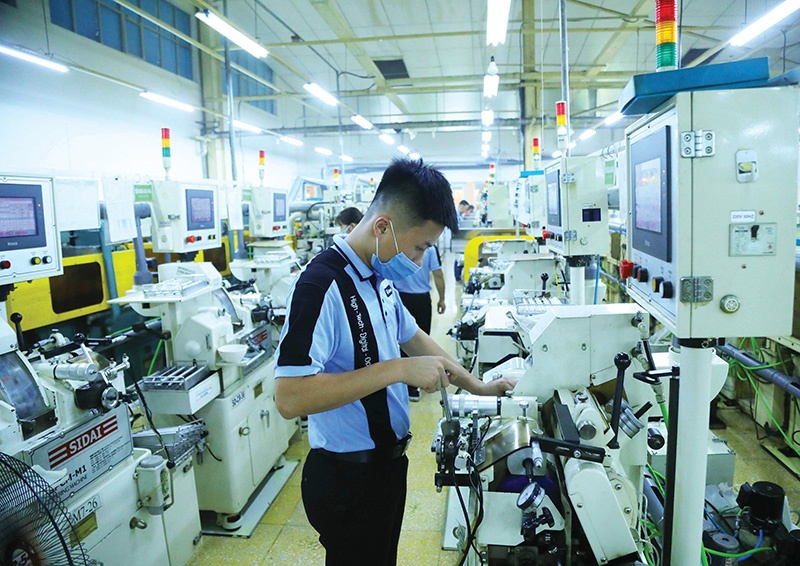Immediate action to lift up business
 |
| Foreign investors still see the many advantages of placing funding in Vietnam. Photo: Dung Minh |
Never before has the World Bank had to continuously revise down Vietnam’s economic growth forecast for a year, and last week it released its lowest projection yet.
“Vietnam’s GDP contracted by 6.2 per cent on-year in Q3/2021, the sharpest drop since quarterly data were compiled in the country. Given this, and depending on the strength of the economic rebound in Q4, GDP growth for 2021 is now estimated to be in the 2-2.5 per cent range, well below our August forecast of 4.8 per cent,” the bank said in its monthly Vietnam Macro Monitoring. The bank had previously projected that the rate would be 6.8 per cent.
As the number of new COVID-19 infections start to fall, Hanoi and several provinces have eased stringent restrictions so that mobility, industrial production index, and retail sales can recover, although they remain lower than a year ago.
This week, the second session of the 15th National Assembly (NA) will open, with one of the biggest focuses laid on saving enterprises and spurring on economic growth.
“Due to the grave aftermath of the pandemic, the economy declined 6.17 per cent on-year in Q3. This has led to an on-year growth rate of merely 1.42 per cent in the first nine months – the lowest 9-month growth level since 2000. It is forecast that the rate will only be about 3 per cent for the whole year – far lower than the 6 per cent set earlier by the NA,” stated Party General Secretary Nguyen Phu Trong while concluding the fourth plenum of the 13th Party Central Committee on October 7.
“Vietnam’s socioeconomic activities are facing massive challenges which may prolong into next year,” he noted. “All activities involving production and business, studies, and the life of labourers in almost all sectors are bogged down in difficulties. Many enterprises have had to stop operations or even gone bankrupt. It is forecast that many key goals for 2021 will not be reached.”
Expanding support
It is expected that the NA will in this session provide comment and adopt a fiscal package to assist enterprises and individuals in terms of tax.
The package may involve exemptions and reductions for enterprises and people in terms of VAT, corporate income tax (CIT), personal income tax (PIT), and other types of taxes arising from business and production activities in the third and fourth quarters of 2021. There will also be an exemption of delayed payments of tax and land rent arising in 2020 and 2021.
According to a government report, the total value of all fiscal solutions that have and will be enacted by the NA and the government in 2021 will be about VND140 trillion ($6.08 billion).
On April 19, the government issued Decree No.52/2021/ND-CP on the extension of time limits for payments of VAT, CIT, PIT, and land rental in 2021.
“The total size of the package was estimated at VND115 trillion ($5 billion). If implemented well, it is expected to help businesses and households maintain economic activities, particularly in tourism, which remains depressed,” said a World Bank bulletin on Vietnam’s economy.
Specifically, Decree 52 extends the time limits for payments of payable VAT for March to August (if making monthly VAT declarations), and the tax periods of the first and second quarters of the year (if making quarterly VAT declarations) of enterprises and organisations.
The extension duration is five months for the VAT amount of the tax periods of March-June, and the tax periods of the first and second quarters; four months for the VAT amount of the tax period of July; and three months for the VAT amount of the tax period of August.
Strong commitments
Last week, Prime Minister Pham Minh Chinh sent a letter to businesspeople nationwide, congratulating them on the occasion of Vietnam Entrepreneurs’ Day on October 13.
He pledged the government will continue creating the best possible conditions for Vietnamese and foreign entrepreneurs to carry out long-term business and investment in the country.
It will enact more measures to help entrepreneurs surmount difficulties and stretch their reach further, he said, adding that a programme on socioeconomic recovery and development, safe and flexible adaptation to the pandemic, and effective control of COVID-19 are being built.
The government and authorised agencies still step up reforming institutions, remove difficulties, and streamlining administrative procedures, thereby creating an open and equal business environment for enterprises to develop and integrate into the world.
“Moreover, the government will also soon complete a socioeconomic recovery and development package which will primarily focus on supporting the recovery process and promoting business production. This will especially help small- and medium-sized enterprises and those that are able to recover and take advantage of the various post-pandemic opportunities,” he continued.
According to the World Bank, reactivating factories and businesses in the services sector will face potential product and labour shortages. Therefore, helping to ease logistics constraints, continued testing and vaccination, and encouraging labour mobility should be prioritised.
The authorities should also adopt a more expansionary fiscal policy and use the various fiscal tools available to support the economic rebound, including easing procedural rigidities in the budget to spend the planned current budget, accelerating implementation of planned public investment, and expanding social protection to households and formal and informal workers.
Attractive investment spot
Despite massive difficulties, many foreign firms are still expressing their optimism in doing business in Vietnam in the long term.
Jade Vichyanond, senior economist at the ASEAN+3 Macroeconomic Research Office based in Singapore, told VIR there remain numerous opportunities in attracting more foreign direct investment (FDI).
“The pandemic has accelerated global supply chain reconfiguration, and Vietnam has emerged as a beneficiary in the process. Even before, Vietnam was among the top destinations for diverted FDI in the region at the height of the US-China trade tensions,” Vichyanond said.
“With its expanding production capacity and relative success in controlling the COVID-19 outbreak, Vietnam is one of the most promising countries for co-location or relocation of production,” Vichyanond elaborated.
“In the near term, Vietnam must once again demonstrate its resilience against the coronavirus pandemic through effective containment of the current outbreaks. Successful control of the situation will safeguard the country’s production capacity and also its reputation as a major investment destination.”
Marko Walde, chief representative of the Delegation of German Industry and Commerce in Vietnam, also told VIR that Vietnam will become a strategic investment destination in the process of restructuring the global and regional supply chain, a potential domestic market to attract international corporations.
“Overall, Vietnam is expected to continue leading the region in recovery and hold its position as an attractive investment hub for German entrepreneurs in the long term. They are drawn in by the reasonable and high-quality labour, open investment environment, new-generation free trade agreements, and also a growing local market,” Walde said.
The World Bank reported that FDI commitment in Vietnam increased by 26.1 per cent on-month in September, “a strong recovery amid the crisis, indicating foreign investors’ continued confidence in Vietnam’s economy in the longer term.”
“Higher FDI commitments were driven by increasing capital flows into manufacturing (up 90.7 per cent on-month, including a $1.4 billion investment in electronics by a South Korea-based company). Overall, committed FDI inflow reached $22.1 billion in the first nine months of 2021, a 4.4 per cent on-year increase. As mobility restrictions were eased, FDI disbursement also rebounded, growing by 57.4 per cent on-month, although it remained 29.5 per cent lower than a year ago. Over the first nine months of 2021, FDI disbursement decreased by 3.5 per cent on-year.”
| Chad Ovel - Chairman, American Chamber of Commerce Vietnam
To maintain regional and global competitiveness, including compared to Malaysia, Indonesia, and Thailand, Vietnam must take action now. Our members recognise that vaccines are the key to enabling a safe reopening and economic recovery. We are grateful that the government prioritised Ho Chi Minh City and the southern economic region as a priority area. Manufacturing needs to reopen now, and businesses with proven track records and clear plans need to be enabled to take on more responsibility for their operations and worker safety, with post-implementation monitoring. Overtime caps need to be lifted to allow for the unique requirements of the manufacturing models, and the need to meet pent-up demand when more operations resume. The manufacturing models created in Ho Chi Minh City and other provinces have been extremely useful as an interim measure. But the models do not work well for large, labour-intensive factories, such as in the footwear and apparel sector. And they are not sustainable in the long term, from a cost, logistical, health, and moral perspective. It will also be vital to have wide coordination of policies, including for transportation of goods and people, and availability of rapid tests. | |
| Alexander Goetz - Chairman, German Business Association
Vietnamese authorities have implemented several drastic regulations to retake control over the pandemic and German businesses have fully complied with those measures. Health and safety of employees are still the priority, but the operational and financial impacts are massive, and businesses started to re-evaluate the situation. The government has to review and adjust regulations to allow business to resume operations in a controlled manner without constant interruptions. One of the major problems remains the handling of infections in factories. Authorities should improve the quick and safe relocation of cases to controlled facilities, while others are tested and monitored intensively on site, without an immediate quarantine requirement. Besides that, we still get many complaints that commuting and the circulation of industrial goods are negatively affected. A clear and centralised guidance on transport and logistics – to be applied by all provinces in the same way – is urgently needed. The free movement of important goods within a city and across provincial borders must be ensured and organised in a transparent way. If the government is not improving those conditions, there is an imminent risk that companies will shift their operations to other countries, which will affect economic recovery even more. | |
| Joseph A Perucca - General director, GIVI Vietnam
We will welcome any package that the government can introduce to help protect the investments that foreign entities make in Vietnam. At this stage, more than ever, companies need clarity and equity. The damage caused first by the pandemic and then by some regulations is too complicated. It is important that we avoid any prolongation of this or the burden will simply too big. As manufacturers, we work on a 6-month production plan, and due to the current situation, we have lost many of our foreign orders. As a private enterprise, we expect the government to protect and help the local population, so that this burden is not transferred to individual households or the private sector. Almost all our workers are Vietnamese and have deeply suffered, us trying to do everything possible for them. Unfortunately, we are already in a situation where we are facing an increase in the cost of work. We see every day people who understandably aspire to a better position and more money because of the difficult times suffered. Unfortunately, we have no way to protect ourselves from this for a long time. We are looking forward to the judgement and intervention of the government that can help all sides overcome this situation. | |
| Aleksandrs Parfjonovs - Head of Vietnam Operations, Grindeks JSC
The lockdown was very long and impacted all businesses, including ours. It has become difficult to access the Drug Administration of Vietnam regarding new pharmaceutical registration updates, as the body was focused on fighting COVID-19. However, recently, I see a lot of positive changes. I think the Vietnamese government did a very good job, as it has been difficult to combat the crisis. A lot of people took it for granted that Vietnam is largely COVID-19-free again and are now adapting. However, the government needs to support businesses and reach more efficient outcomes, such as simplifying visa issues for foreign experts. | |
| Greg Ohan - CEO, The Sentry
Bottlenecks for enterprises have impacted all firms globally in some way. Vietnam is no exception – and we have done well to contain the pandemic. But due to global interconnectednes, our economy has been affected, resulting in losses for many businesses. Multiple companies have found it extremely challenging to trade due to domestic travel restrictions, but also international restrictions of goods and people when it comes to skilled labour. Alternate means of transport, as well as the work-from-home schemes have resulted in inefficiencies, increased prices, and increased demand for cargo space on air routes. As a property asset management firm, we have been fortunate by offering real estate service products to cater for the new normal. Our recent co-working platform CONNECT was launched in November and is the largest new co-working location in Vietnam, feeding the demand of businesses looking for flexible office solutions. | |
| David Salt - COO, LOGIVAN Technologies
Now, as the COVID-19 infection rate decreases, the risk of economic hardship must also be seriously considered to safeguard people’s wellbeing. The most beneficial action for the economy is to reopen travel and business at the earliest practical point. Allowing businesses to get back to trading will continue the economic progress that has improved incomes, standards of living, and Vietnam’s position in the global economy. Reducing the rate of compulsory insurance contribution by a meaningful percentage is an excellent place to intervene. Because reducing these taxes will decrease the cost of employing staff, increasing the number of jobs retained and created, so that more people can continue to work and maintain their skills and bring income to their households. | |
| Cao Huu Hieu - Vice chairman, Vietnam National Textile and Garment Group
Garment and textile companies, especially in the south, are seriously impacted by the pandemic. Almost all enterprises in this industry have either cases or cannot maintain the stay-at-work model, thus operations were disrupted, and orders were cancelled or suspended. Our group currently owns over 40 member companies, specialising in spinning, weaving, and dyeing – all of which are affected by the difficult situation. Thus, the Ministry of Labour, Invalids, and Social Affairs asked to remove the monthly overtime cap, simultaneously increasing the overtime per year. Along with this, we expect that the government will accelerate vaccinations for workers in the sector. Also, it is necessary to apply a synchronous regulations for commuting between localities. | |
| Ian Nguyen - Co-founder and managing director, Delta Offshore Energy
Delta’s 3,200MW Bac Lieu liquefied natural gas-to-power project has completed about 95 per cent legal requirements of the preparation phase. However, there are nine outstanding issues. Two involve the appraisal of feasibility reports by the Ministry of Industry and Trade, and approval of state assurances for project implementation as stipulated in the Law on Investment 2020 and Decree No.31/2021/ND-CP. The latter will enable the negotiation and signing of a power purchase agreement, allowing the project to meet all bankability requirements of international lenders. These issues have been recently discussed between Bac Lieu People’s Committee and a special task force established in July. The task force will submit a report to the prime minister for final decision and Delta looks forward to receiving continued support from the government for this important national infrastructure project. | |
| Bui Nguyen Khoa - Deputy head of Research, BIDV Securities Company
The pandemic is largely under control and the vaccine supply is expected to increase, which might help macroeconomic recovery in the last months of the year. We revised down the 2021 GDP outlook to 3.47 per cent. However, it is not possible to exclude the possibility that the pandemic will still have a partial negative impact. The number of business shutdowns continues to decrease, showing the ability to adapt. The vaccination rate continues to be maintained and business activities are likely to recover positively. Investors can consider fields like infrastructure, construction, and raw materials to profit from upcoming national public investment projects. In our view, investors should keep the portfolio weight at a reasonable level and only buy and open new positions when stocks move back to strong support levels or accumulate in the short term. |
What the stars mean:
★ Poor ★ ★ Promising ★★★ Good ★★★★ Very good ★★★★★ Exceptional
Related Contents
Latest News
More News
- Foreign leaders extend congratulations to Party General Secretary To Lam (January 25, 2026 | 10:01)
- 14th National Party Congress wraps up with success (January 25, 2026 | 09:49)
- Congratulations from VFF Central Committee's int’l partners to 14th National Party Congress (January 25, 2026 | 09:46)
- 14th Party Central Committee unanimously elects To Lam as General Secretary (January 23, 2026 | 16:22)
- Worldwide congratulations underscore confidence in Vietnam’s 14th Party Congress (January 23, 2026 | 09:02)
- Political parties, organisations, int’l friends send congratulations to 14th National Party Congress (January 22, 2026 | 09:33)
- Press release on second working day of 14th National Party Congress (January 22, 2026 | 09:19)
- 14th National Party Congress: Japanese media highlight Vietnam’s growth targets (January 21, 2026 | 09:46)
- 14th National Party Congress: Driving force for Vietnam to continue renewal, innovation, breakthroughs (January 21, 2026 | 09:42)
- Vietnam remains spiritual support for progressive forces: Colombian party leader (January 21, 2026 | 08:00)










 Tag:
Tag:




















 Mobile Version
Mobile Version